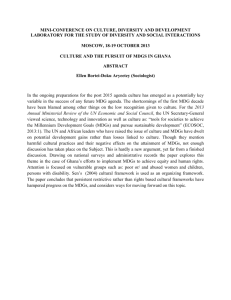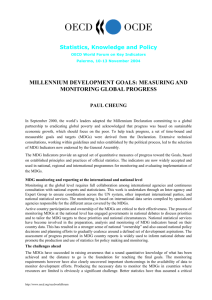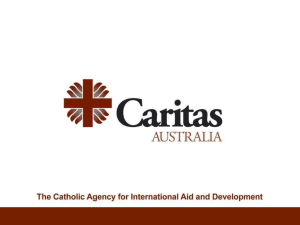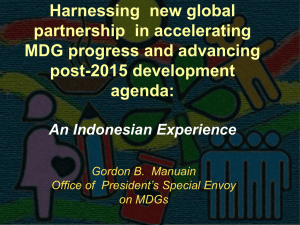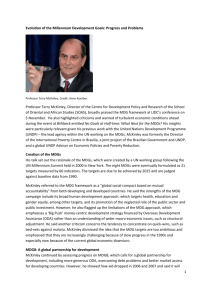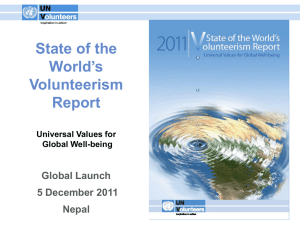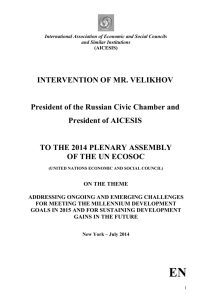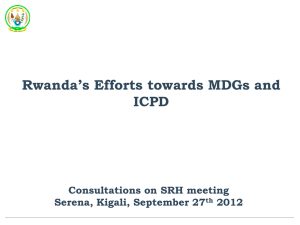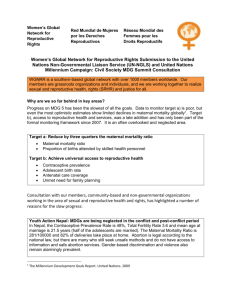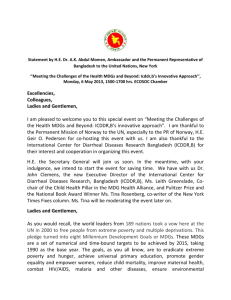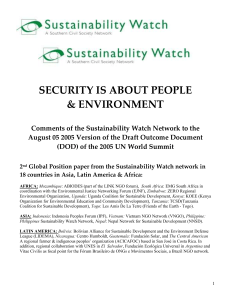The Millennium Development Goals Summit
advertisement
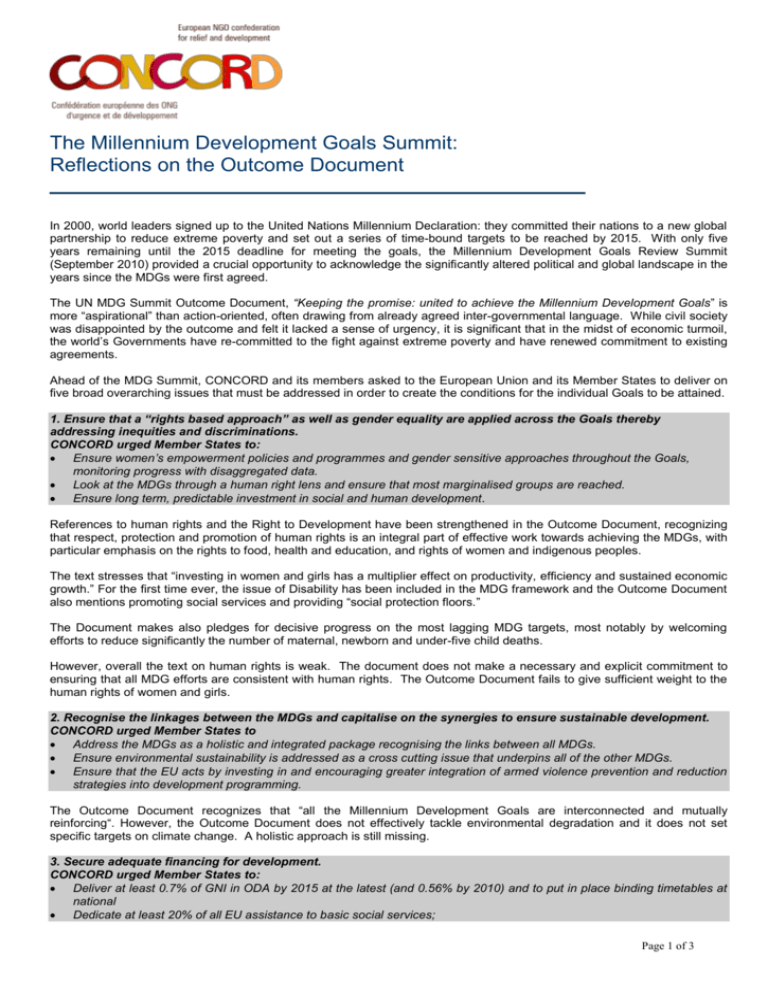
The Millennium Development Goals Summit: Reflections on the Outcome Document In 2000, world leaders signed up to the United Nations Millennium Declaration: they committed their nations to a new global partnership to reduce extreme poverty and set out a series of time-bound targets to be reached by 2015. With only five years remaining until the 2015 deadline for meeting the goals, the Millennium Development Goals Review Summit (September 2010) provided a crucial opportunity to acknowledge the significantly altered political and global landscape in the years since the MDGs were first agreed. The UN MDG Summit Outcome Document, “Keeping the promise: united to achieve the Millennium Development Goals” is more “aspirational” than action-oriented, often drawing from already agreed inter-governmental language. While civil society was disappointed by the outcome and felt it lacked a sense of urgency, it is significant that in the midst of economic turmoil, the world’s Governments have re-committed to the fight against extreme poverty and have renewed commitment to existing agreements. Ahead of the MDG Summit, CONCORD and its members asked to the European Union and its Member States to deliver on five broad overarching issues that must be addressed in order to create the conditions for the individual Goals to be attained. 1. Ensure that a “rights based approach” as well as gender equality are applied across the Goals thereby addressing inequities and discriminations. CONCORD urged Member States to: Ensure women’s empowerment policies and programmes and gender sensitive approaches throughout the Goals, monitoring progress with disaggregated data. Look at the MDGs through a human right lens and ensure that most marginalised groups are reached. Ensure long term, predictable investment in social and human development. References to human rights and the Right to Development have been strengthened in the Outcome Document, recognizing that respect, protection and promotion of human rights is an integral part of effective work towards achieving the MDGs, with particular emphasis on the rights to food, health and education, and rights of women and indigenous peoples. The text stresses that “investing in women and girls has a multiplier effect on productivity, efficiency and sustained economic growth.” For the first time ever, the issue of Disability has been included in the MDG framework and the Outcome Document also mentions promoting social services and providing “social protection floors.” The Document makes also pledges for decisive progress on the most lagging MDG targets, most notably by welcoming efforts to reduce significantly the number of maternal, newborn and under-five child deaths. However, overall the text on human rights is weak. The document does not make a necessary and explicit commitment to ensuring that all MDG efforts are consistent with human rights. The Outcome Document fails to give sufficient weight to the human rights of women and girls. 2. Recognise the linkages between the MDGs and capitalise on the synergies to ensure sustainable development. CONCORD urged Member States to Address the MDGs as a holistic and integrated package recognising the links between all MDGs. Ensure environmental sustainability is addressed as a cross cutting issue that underpins all of the other MDGs. Ensure that the EU acts by investing in and encouraging greater integration of armed violence prevention and reduction strategies into development programming. The Outcome Document recognizes that “all the Millennium Development Goals are interconnected and mutually reinforcing“. However, the Outcome Document does not effectively tackle environmental degradation and it does not set specific targets on climate change. A holistic approach is still missing. 3. Secure adequate financing for development. CONCORD urged Member States to: Deliver at least 0.7% of GNI in ODA by 2015 at the latest (and 0.56% by 2010) and to put in place binding timetables at national Dedicate at least 20% of all EU assistance to basic social services; Page 1 of 3 Step up efforts to improve the quality of aid Phase out harmful economic or trade policy conditionality attached to development aid as well as conditionality on migration control measures. Provide developing countries with the tools they need to mobilise domestic resources effectively. Introducing “innovative” sources of finance (ie, in addition to traditional ODA). Cancel all debt for those developing countries which currently cannot finance the MDGs from domestic resources. The text repeatedly refers to the centrality of MDG8 and the need to improve the quality and the quantity of aid. It highlights a renewed commitment to the target of 0.7% of GNI for Official Development Assistance and stresses the need for ”all donors to establish, as soon as possible, rolling indicative timetables that illustrate how they aim to reach their goals” . But the text is particularly weak on MDG 8. It fails to address the need to integrate greater policy space for developing countries into existing global rules; inappropriate external conditionalities imposed by donors and International Financial Institutions; and the lack of policy space resulting from dictates of international market forces on national policy choices. The document does refer to the need to combat tax evasion and capital flight and enhancing international cooperation on tax matters, but it falls short of the many calls for the UN to establish an intergovernmental committee on International tax matters. The text limits itself to looking forward to the upcoming UN Secretary-General’s report on this issue. 4. Address incoherencies across the policy spectrum that undermine development. For this to happen, CONCORD has identified the changes needed: Make more explicit the multiple linkages between different policy areas. Ensure that its policy-making becomes more transparent and participatory Strengthen the capacity of both national and EU administrations to improve the coherence of their respective policies in relation to EU and national level development objectives as well as international commitments on development; Make sure that the work programme on PCD for the 2010-2013 period is developed with a view to attaining the MDG targets and to assessing the impact of all relevant EU policies on the progress made towards the MDGs. Policy coherence for development (PCD) is an important tool that, if implemented effectively, could have a markedly beneficial impact on sustainable development, respect for human rights and poverty reduction. The Outcome Document calls “for increased efforts at all levels to enhance policy coherence for development”, but does not offer any practical recommendations. Whilst the text is strong on the need for national ownership and the primary responsibility of developing countries for achievement of the MDG goals, there is a stark lack of recognition of the role played by international and developed country policies (trade, agriculture, finance, development, inadequate regulatory regimes) on the ability of developing countries to do so. Developed country governments have in fact sought to further distance themselves from this responsibility by including language which places the responsibility on developing countries to evaluate the trade–off between national policy space and international agreements. 5. Strengthen accountability: development driven by Southern contexts. Donors must recognise that the MDGs do not exist in a political vacuum. Improving governance and addressing corruption in developing countries must be a core concern – and this can only be effectively tackled by adopting a less technocratic approach to international development. Increasing the participation of all segments of society in decision making processes, and working towards increased transparency and accountable governance are recognised among best practices that should be built on going forward. The text makes only fairly general references to accountability. The final outcome document makes mention of that the commitments made by developed and developing countries in relation to the MDGs require mutual accountability. However, the lack of agreement on a framework that would allow citizens and communities to hold their governments, and beyond this, all development partners, to account for their MDG commitments is inconsistent. In summary: CONCORD is disappointed that the Outcome Document Does little more than reiterate previous promises. Does not seriously address the lack of progress towards the MDGs . Does not agree any new policies, resources or improvements in the international economic environment. Does not include sufficient clear actions for implementation. CONCORD is also disappointed that civil society did not have a more significant role – access or voice – in the MDG Summit itself, or in the negotiations of the Outcome Document. Page 2 of 3 Looking Ahead In 2000 the international community made a commitment to the poor – and rallied around a set of goals in a way that no other development framework has managed previously. While it is important to begin to think about post 2015, it is equally important that: Planning for the post 2015 does not take away from the need to deliver now on MDG commitments. Governments (donor and recipient) have made commitments that need to be kept, not replaced. A post-2015 development agenda should not merely be a second iteration of the MDG framework. Rather commitments should build on successes and should be framed to take account of the entire body of UN conventions and the values and principles articulated within them. For example, o New developments in international human rights law such as the agreement on an Optional Protocol to the International Covenant on Economic, Social and Cultural Rights need to be reflected. o Recent discussions to reverse and compensate the development impact of Climate Change would have to be integrated. o The global partnership for development and the systemic approach to development would have to be a cornerstone. Any new ‘post MDG’ framework is robust and ambitious and must address the 5 issues highlighted in this paper. Civil society (Northern and Southern) be meaningfully involved in planning for post 2015. CONCORD also believes that: The United Nations agencies with full member state support, must review (annually) the MDGs, both individually and collectively to ensure satisfactory progress is made against each of the MDGs. A joint and concerted effort is required to identify what does and does not work and to find as many innovative models, especially in light in the decline in resources available. There needs to be a collective focus on meeting the goals, even if we know not all of them will be met. Data is needed on best practices and efficiencies, especially in order to best formulate the next development agenda after 2015. Additionally: The UN should play a leading role in developing a mechanism to hold governments to account for their commitments made on the MDGs. The UN should facilitate civil society involvement in meeting the MDGs, planning for post MDGs and holding their governments to account. NGOs should also be accountable for commitments made at the Summit: Developing countries need to have strong delivery mechanisms in place to ensure delivery of commitments. o It is important that developing countries need to have strong implementation plans in place, setting clearly defined national targets to realize economic, social and cultural rights. o They must also end discrimination and ensure that people living in poverty can participate in the MDG efforts. o National accountability mechanisms must be put in place to enable civil society to hold developing country governments to account for their commitments. o Freedom of association, expression and information must be allowed in order to ensure that such accountholding can take place. For the European Union: CONCORD welcomes the European Union’s engagement in the MDG process. The EU should respect its commitment to hold its member states to account for commitments made to the MDGs, including providing 0.7% of GNI for development. We encourage the EU to show global leadership on innovative sources of financing. The EU should introduce such sources, including the Financial Transaction Tax (in addition to traditional ODA). The EU must advocate for this agenda internationally and also act swiftly to put in place such measures within the Eurozone in the short term. We urge the EU to phase out harmful economic or trade policy conditionality attached to development aid as well as conditionality on migration control measures. The Lisbon Treaty defines poverty reduction and eradication as its main development goal. This can only be achieved if all EU policy areas, especially trade, energy, external relations, security, environment and climate change, migration, agriculture and fisheries policies contribute to this goal, or at minimum ensure that they do not contradict it or prevent its achievement. January 2011 Page 3 of 3
